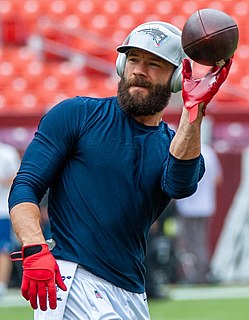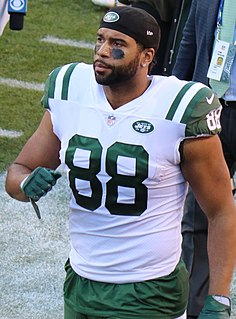A Quote by Julian Edelman
The draft is an exciting time.
Quote Topics
Related Quotes
Almost all good writing begins with terrible first efforts. You need to start somewhere. Start by getting something-anything-down on paper. A friend of mine says that the first draft is the down draft-you just get it down. The second draft is the up draft-you fix it up. You try to say what you have to say more accurately. And the third draft is the dental draft, where you check every tooth, to see if it's loose or cramped or decayed, or even, God help us, healthy.
It can take years. With the first draft, I just write everything. With the second draft, it becomes so depressing for me, because I realize that I was fooled into thinking I'd written the story. I hadn't-I had just typed for a long time. So then I have to carve out a story from the 25 or so pages. It's in there somewhere-but I have to find it. I'll then write a third, fourth, and fifth draft, and so on.
With Ibrahim al-Koni, what I figured out was - and you'll see this in his novels - if your time is limited, make the unit of the chapters small so that you can finish one a day, at least in the first draft. Once you have the first draft it's living, and you can coax it to grow and trim it and reshape it and so on. But get that first draft. I think if I'd gone to an MFA program and learned that, it would have been money well spent. But translation has been that for me.
I taught everyone a very bad lesson at my publisher because they actually gave me deadlines this time and I'm now meeting them. I used to say, "Here's my book; it's six years late." I'm so much faster now, and work differently. With all the years of writing, I think I still draft as obsessively, but I think back to writing. On your first story, you start at draft one. On your second story, you start at draft ten. On your third story, you start at draft one hundred. If you need a hundred and eight drafts, you may write eight instead of a hundred and eight.
I am a technophile, so there is no such thing as a first draft. The first draft plunges on, and about a quarter of the way through it I realise I'm doing things wrong, so I start rewriting it. What you call the first draft becomes rather like a caterpillar; it is progressing fairly slowly, but there is movement up and down its whole length, the whole story is being changed. I call this draft zero, telling myself how the story is supposed to go.




































